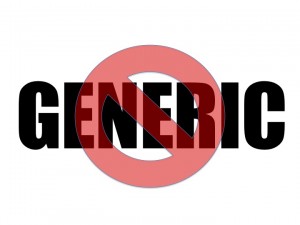There are only two questions left in our series of questions you must ask your agency. These are questions you must ask your agency or consultant and be happy with the answers. Question #7 is: “Are you creating solutions to solve my specific problems or are you selling me generic solutions?”
 Your world is far too unique and complex to settle for a solution that “works” for another organization. It doesn’t matter if you are large or small, international or local, your world is complex, dynamic and unique. A one-size-fits-all solution is tempting and even popular, but generic solutions will deliver generic results (at best).
Your world is far too unique and complex to settle for a solution that “works” for another organization. It doesn’t matter if you are large or small, international or local, your world is complex, dynamic and unique. A one-size-fits-all solution is tempting and even popular, but generic solutions will deliver generic results (at best).
The classic example we encountered recently is a regional ministry whose new donor acquisition program was a very generic solution. This “big agency” solution was newspaper inserts in local newspapers plus more inserts in a HUGE metropolitan newspaper nearby. The other component was a carpet-bombing direct mail acquisition strategy that included 5+ impacts in an eight week period–complete and utter saturation.
Unfortunately there were several problems with this generic solution. At first glance the results weren’t too bad, nothing impressive, but not horrible. As we dug through the details, we discovered that most of the “new donors” the ministry was “acquiring” were names already on their house file–either lapsed donors or non-donors. Sadly, they were paying to acquire names they already had on file. And being told they were newly acquired names (a really neat trick on the big agency’s part).
Because it was a generic solution, the ministry wasn’t able to coordinate their house cultivation mailings with the acquisition. So a lapsed donor (or a non-donor like a volunteer) not only received the 5+ impacts and the opportunity to see the newspaper insert, they got at least 2 house mailings from the ministry. Count ’em–6 to 7 impacts in less than 8 weeks (plus the possibility of seeing the newspaper insert). Worst case–9 impacts in 8 weeks. Yikes.
Wait a minute, how bad is that?
Well let’s think about it. Most of the impacts assumed that the donor had no relationship with the ministry. That isn’t good strategy to reactivate a lapsed donor. To reactivate lapsed donors, the very best strategy is NOT to ignore history. The best strategy is to acknowledge the relationship and begin to woo them back.
Also, the impacts weren’t cohesive. The acquisition’s primary “ask” wasn’t central to the ministry’s focus. The “big agency” produced a good acquisition package, BUT donors didn’t continue as donors when the ministry tried to cultivate them for a second gift. One gift and out. One very-expensive-to-acquire name and then nothing. Our ministry friends bought a generic acquisition solution and what they got was a painful, counter-productive “churn and burn” strategy–names coming in they think are new donors who never give a second gift. Painful. Sadly, because it can be difficult to spot.
Oh, and there was no integration. So if a prospective donor went online to checkout the ministry (as more and more are doing) the ministry’s website didn’t reflect the look, language or strategy of the generic acquisition effort.
Sadly, this isn’t an extreme example. Generic solutions can hurt you. And if you also are getting generic analysis with your generic solutions, you are buying a world of hurt because you will have difficulty figuring out why things aren’t working the way you expect them too.
And just a note: your logo, your ministry name and some specific information about you slapped onto a generic solution does NOT change the fact that it is a generic solution. I guess that would be called a branded generic solution (but it is still a generic solution).
What you need and what will work best for you in the long-term is a solution designed from the ground up for your ministry. The starting place for any fundraising strategy cannot be direct mail package configurations and mailing specification. Solutions begin by understanding what your specific needs are. Just because a solution is a successful solution in one place does not mean it will work for you.
And don’t you believe that you have to settle for a generic solution because a specific solution is too expensive. That’s just not true.
In fundraising strategy and nonprofit marketing, generic is the most expensive option.
So, how about you? Any thoughts on the hazards of generic solutions? (Or want to guess what Ask Your Agency #1 will be?)
Here’s the list of our “Ask Your Agency/Consultant” questions so far:
Question 1: (not announced yet)
Question 2: Will you tell me the truth?
Question 3: Have you disclosed all commissions?
Question 4: How do you integrate fundraising and marketing?
Question 5: Have you worked in a ministry?
Question 6: Is my data secure?
Question 7:”Are you creating solutions to solve my specific problems or are you selling me generic solutions?”
Question 8: How will the new 990 requirements effect me?
Question 9: Do you walk the walk?
Question 10: Are you a real expert?

Steve Thomas
Partner, Oneicity

